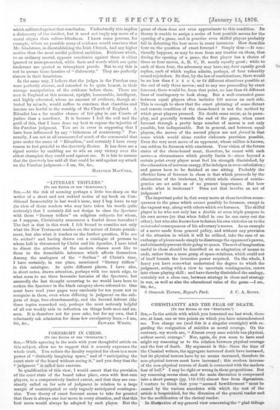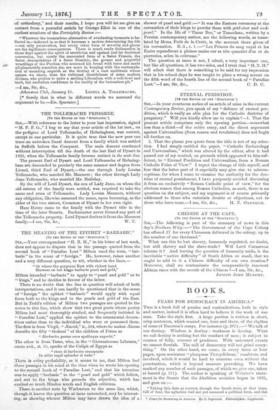CHRISTIANITY AND THE FEAR OF DEATH.
[To TRH EDITOR OF THE "SPECTATOR."] Srn,—In the article with which you honoured me last week, there- are, at least, one or two points on which you have misunderstood me. You charge me (and this is a singular oversight) with re- garding the resignation of suicides as moral courage. On the contrary, my words are, "Almost every sane suicide has physical, without moral, courage." Nor, again, do you seem to have read aright my reasoning as to the relation between physical courage and the fear of death. My argument is this : Since the time of the Classical writers, the aggregate terrors of death have increased, but its physical terrors have by no means increased, therefore its non-physical terrors must have increased ; this modern increase- of the non-physical terrors of death is connected with the modern fear of helL* I may be right or wrong in these propositions. But my reasoning seems clear, and the main discussion is compressed into a short passage (pp. 116-119) almost free from digressions._ I venture to think that your "amused bewilderment" must be caused by the various anecdotes with which the rest of the article is besprinkled, for the diversion of the general reader and; for the mollification of the clerical reader.
In illustration of my general view concerning the "glad tidings.
,of orthodoxy," and their results, I hope you will let me give an extract from a powerful article by George Eliot in one of the -earliest numbers of the Fortnightly Review :— " Wherever the tremendous alternative of everlasting torments is be- lieved in—believed in so that it becomes a motive determining the life —not only persecution, but every other form of severity and gloom are the legitimate consequences. There is much ready declamation in -these days against the spirit of asceticism and against zeal for doctrinal -conversion, but surely the macerated form of a Saint Francis, the ‘fierce denunciations of a Saint Dominic, the groans and prayerful wrestlings of the Puritan who seasoned his, bread with tears and made all pleasurable sensation sin, are more in keeping with the contempla- tion of unending anguish as the destiny of a vast multitude whose nature we share, than the rubicund cheerfulness of some modern divines, who profess to unite a smiling Liberalism with a well-bred and -tacit, but unshaken confidence in the reality of the bottomless pit."
—I am, Sir, &c.,
Athenteum Club, January 10. Ltolim. A. TOLLEMACHE. Surely, that is what in different words we assumed the argument to be.—En. Spectator.]



































 Previous page
Previous page